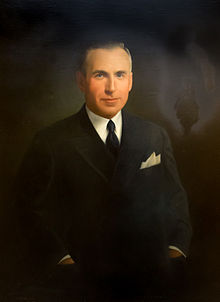Robert E. Quinn
| Robert E. Quinn | |
|---|---|
 |
|
| 1st Chief Justice of the United States Court of Appeals for the Armed Forces | |
|
In office June 20, 1951 – 1971 |
|
| President | Harry Truman |
| Preceded by | (none) |
| Succeeded by | William H. Darden |
| 58th Governor of Rhode Island | |
|
In office January 5, 1937 – January 3, 1939 |
|
| Lieutenant | Raymond E. Jordan |
| Preceded by | Theodore F. Green |
| Succeeded by | William Henry Vanderbilt III |
| 75th Lieutenant Governor of Rhode Island | |
|
In office January 3, 1933 – January 5, 1937 |
|
| Governor | Theodore F. Green |
| Preceded by | James G. Connelly |
| Succeeded by | Raymond E. Jordan |
| Member of the Rhode Island Senate | |
|
In office 1923–1925 1929–1933 |
|
| Personal details | |
| Born |
Robert Emmet Quinn April 2, 1894 Phenix, Rhode Island, U.S. |
| Died | May 19, 1975 (aged 81) Kent Nursing Home, Warwick, Rhode Island |
| Resting place | Quinn Family Cemetery West Warwick, Rhode Island |
| Nationality | Irish American |
| Political party | Democratic |
| Spouse(s) | Mary Ide Carter Quinn |
| Parents | Charles Quinn Mary Ann (McCabe) Quinn |
| Alma mater |
Brown University Harvard Law School |
| Profession |
Attorney Politician |
| Military service | |
| Service/branch | United States Foreign Service |
| Years of service | 1917-1919 |
Robert Emmet Quinn (April 2, 1894 – May 19, 1975) was an American attorney and politician from Rhode Island. He served as the 58th Governor of Rhode Island and Judge for the Rhode Island Superior Court.
Quinn was born in 1894 in Phenix, Rhode Island, the son of Charles Quinn and Mary Ann (McCabe) Quinn. He graduated from Brown University in 1915, and completed his law degree from Harvard Law School in 1918. He served in the United States Foreign Service during World War I as a member of the U.S. Diplomatic Intelligence Service in England and France. After he left the Foreign Service in 1919, he practiced law with his uncle in Rhode Island.
He began his political career as a Democrat in the Rhode Island Senate serving from 1923 to 1925 and again from 1929 to 1933. In 1932 he was elected Lieutenant Governor of Rhode Island and served from 1933 to 1937. He served as Governor from 1937 to 1939.
Quinn entered the Rhode Island Senate in 1923 as one of a trio of young progressive politicians, a group which included Governor William S. Flynn and Lt. Governor Felix A. Toupin. Their agenda of reform included a 48-hour work week and an end to property qualifications for voting in city council elections. The Republican-controlled state senate blocked these reforms, and the 1923 and 1924 sessions were spent mostly in deadlock.
Finally, in June 1924, Quinn and Lt. Governor Toupin came up with a desperate plan: they would stage a marathon multi-day filibuster. Toupin read from "Hamlet" and the Encyclopedia Britannica, in hopes that a enough exhausted Republicans would leave the chamber, giving Democrats the majority they needed to pass the measure. By June 19, Republicans had had enough, and sent a Boston gangster to set off a bromine gas bomb in the Senate chamber. Quinn and Toupin were unhurt, but the entire Republican delegation fled the chamber, and indeed fled the state. The Senate was then unable to form a quorum to get anything done. The Providence Journal blamed the gas attack on the Democrats, who lost widely in November 1924.
...
Wikipedia
